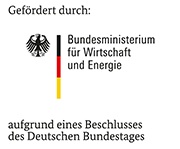163 ZN

Hochtemperaturofen in Betrieb
| Period: | 2004-11-01 to 2006-10-31 |
|---|---|
| Funder: | Federal Ministry for Economics and Technology (BMWI, Germany) via AiF |
| Project Manager: | Dr. Maik Malessa |
| Research Group: | High Temperature Materials |
In many industrial gasification and combustion processes highly corrosive conditions are encountered that make high demands on metallic components of the used materials. Examples are plants for the incineration of waste, special refuses, bio mass, sludge etc. These charges contain high quantities of chlorine and sulphur compounds as well as heavy metals, that have a strong corrosive effect based on attacks from gaseous species and saline melts. Fig. 1 shows the mechanism of chlorine corrosion. To limit the extent of the corrosive attack many plants are operated at relatively low temperatures, although an operation at higher temperatures would be desirable from an economic point of view, especially in waste incineration plants with regards to an improved degree of efficiency. Additionally certain process temperatures shall not fall below specific limits to comply with legal requirements of emission protection. The methods for protection against corrosion used so far like galvanic nickel-plating, build-up welding or thermal spraying of nickel based materials or the use of compound tubes (high-alloyed tube casing on ferritic heat exchanger tube) do not allow a significant increase of the process temperature above 400°C. In the field of waste incineration the demand on reliable, powerful capacity for incineration will raise due to the prohibition of the disposal of untreated waste, in force since July 2005 in Germany. Therefore the requirements for an efficient concept of corrosion protection that enable higher process temperatures combined with extended lifetime are growing.
back
Das IGF-Vorhaben Nr. 163 ZN der Forschungsvereinigung DECHEMA e.V., Theodor-Heuss-Allee 25, 60486 Frankfurt am Main wurde über die AiF im Rahmen des Programms zur Förderung der industriellen Gemeinschaftsforschung (IGF) vom Bundesministerium für Wirtschaft und Energie aufgrund eines Beschlusses des Deutschen Bundestages gefördert.